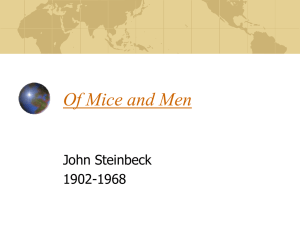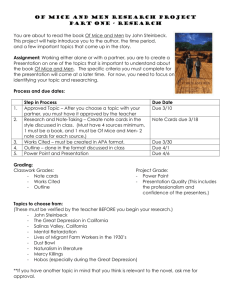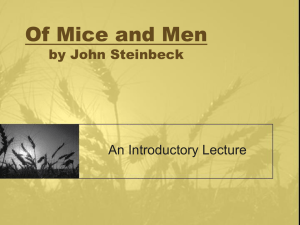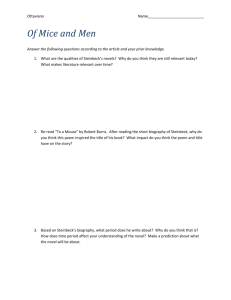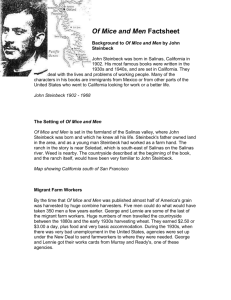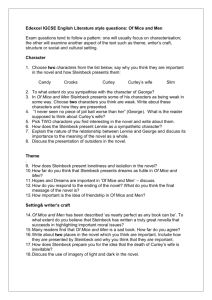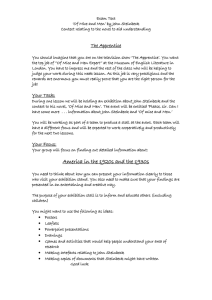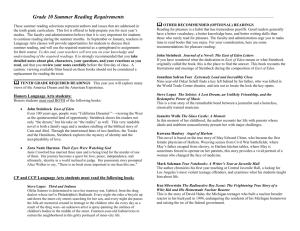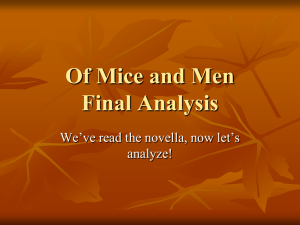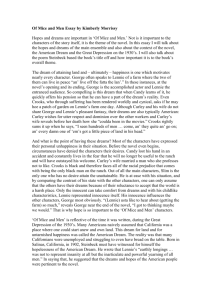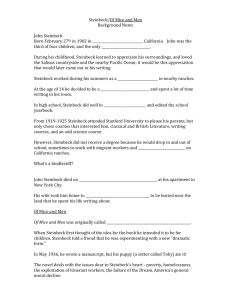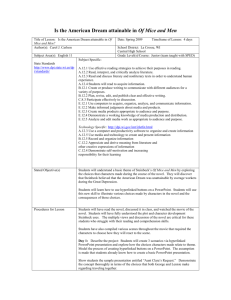Of Mice and Men
advertisement
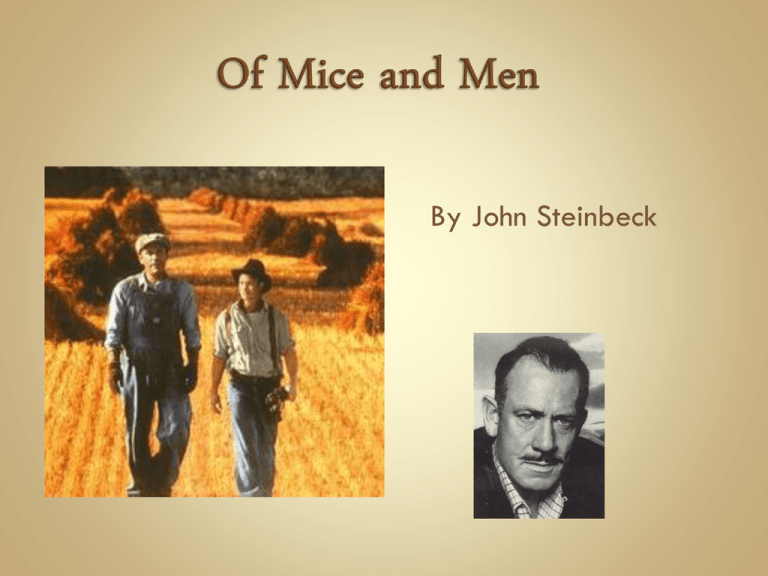
By John Steinbeck Born in Salinas, California, February 27, 1902. Influences: His mother, a schoolteacher, encouraged him to read. Worked on farms/ranches w/migrant workers as a young man. The Salinas Valley where he grew up. The Great Depression. Attended Stanford University; did not complete degree. Left to pursue a career as a writer. Worked as a war correspondent during WWII. Common themes of Steinbeck’s stories: Wrote 16 novels and many short stories. Won the Pulitzer Prize in 1940 for The Grapes of Wrath. the darker side of human nature man’s inherent goodness and the human capacity to overcome evil. The novel is set in the farmland of the Salinas Valley, California, where John Steinbeck was born. The ranch in the novel is near Soledad, California, which is south-east of Salinas on the Salinas River. The countryside described at the beginning of the novel, and the ranch itself is based on Steinbeck’s own experiences. A hobo, especially one who carries a bedroll. The novel deals with the issues dear to Steinbeck’s heart : poverty homelessness the exploitation (abuse) of migrant workers the failure of the Dream America’s general moral decline. Before technology created farm machinery, humans had to do a lot of the farm work by hand. Between the 1880s and the 1930s, thousands of men would travel the countryside in search of work. Such work included the harvesting of wheat and barley. These workers would earn $2.50 or $3.00 a day, plus food and shelter. During the 1930s, the unemployment rate was high in the U.S., and with so many men searching for work, agencies were set up to send farm workers to where they were needed. In the novel, George and Lennie (the two main characters) were given work cards from Murray and Ready’s, which was one of the farm work agencies. You can be successful if you work hard and live morally. America is the land of opportunity. Freedom to work hard and be happy is enshrined in the Constitution. The Dream assumes equality of opportunity, no discrimination, freedom to follow goals and freedom from victimization. The idea of an American Dream for many was broken when in 1929, the Wall Street crashed, marking the beginning of the Great Depression. This era affected the whole world during the 1930s, but even in the midst of hardship, some people’s dreams survived. Thousands of people made their way west towards California to escape from their farmlands in the Midwest that were failing due to drought. The characters of George and Lennie dreamt of having a “little house and a couple of acres” which was their own dream. The Nature of Dreams Loneliness In essence, Of Mice and Men is as much a story about the nature of human dreams and aspirations and the forces that work against them as it is the story of two men. Humans give meaning to their lives—and to their futures—by creating dreams. Without dreams and goals, life is an endless stream of days that have little connection or meaning. George and Lennie’s dream—to own a little farm of their own—is so central to Of Mice and Men that it appears in some form in five of the six chapters. In addition to dreams, humans crave contact with others to give life meaning. Loneliness is present throughout this novel. Powerlessness Steinbeck’s characters are often the underdogs, and he shows compassion toward them throughout the body of his writings. Powerlessness takes many forms—intellectual, financial, societal—and Steinbeck touches on them all. Fate Life’s unpredictable nature is another subject that defines the human condition. Just when it appears that George and Lennie will get their farm, fate steps in. My Brother’s Keeper Steinbeck makes the reader wonder whether mankind should go alone in the world or be responsible and helpful to others who are less fortunate. Nature Steinbeck uses nature images to reinforce his themes and to set the mood. The title of the novel comes from a poem by the Scottish poet Robert Burns (1759 -96): The best laid schemes o’ mice and men Gang aft agley [often go wrong] And leave us nought but grief and pain For promised joy! The best laid schemes (plans) of mice and men often go wrong- referring to a little mouse who had so carefully built her burrow in a field to protect herself and her little mice babies – and the burrow is turned over and destroyed by the man plowing.
